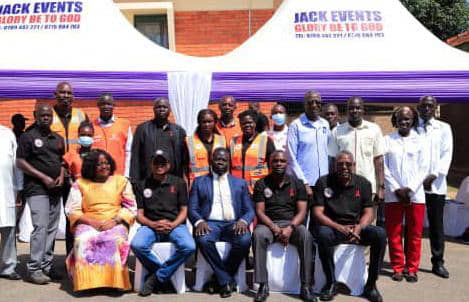Judiciary Champions Fight to End AIDS by 2030 in Arua Health Camp

In a bold step toward strengthening Uganda’s fight against HIV/AIDS, the Judiciary HIV/AIDS Committee held a Health Awareness Camp at the Arua High Court Grounds under the rallying call “Ending AIDS by 2030: Building Sustainable HIV Response.”
The event brought together judicial officers, court staff, health professionals, political and religious leaders, and security personnel in a show of unity and purpose.
Presiding over the event, Salim Komakech, Resident City Commissioner of Arua City, commended the Judiciary for its leadership in integrating HIV/AIDS response into institutional operations.
He praised the Judiciary’s policy of incentivizing openness among staff living with HIV, a model he encouraged other government agencies to adopt.
Komakech emphasized the urgent need to reinforce the 90-90-90 strategy, a global UNAIDS target aiming for 90% of people living with HIV to know their status, 90% of those diagnosed to receive sustained treatment, and 90% of those treated to achieve viral suppression.
He challenged communities to confront HIV with the same seriousness as other preventable causes of death like road accidents, especially among high-risk groups such as the security sector.
Delivering remarks on behalf of the Arua Resident Judge, Acting Assistant Registrar Paul Matyama urged participants to take up the mantle of HIV prevention within their families and communities.
He stressed that the Judiciary is committed to supporting national health priorities by not only providing accurate information but also making prevention tools readily accessible.
“Condoms will be made available at court premises—not just for Judiciary staff, but for the public,” he announced, highlighting that proper and stigma-free usage is encouraged.
In a progressive move, condom distribution and uptake will be included in court administrative reports.
A depletion of condom stock, he noted, will be seen as a sign of increased awareness and responsible behavior.
Matyama also advised against premature assumptions based on a single HIV test, advocating for confirmatory testing before resuming sexual activity.
“A confirmatory test is necessary to be sure of your status. Until then, abstain,” he urged.
Festo Nsenga, representing the Chairperson of the Judiciary HIV/AIDS Committee, underscored the event’s role in eliminating stigma and promoting a health-conscious judiciary.
He highlighted that this Health Camp is part of a broader strategy involving regional sensitizations, public outreach through radio shows, and development of accessible information materials.
“Our aim is to ensure that everyone; staff, court users, and communities—benefit from a justice system that also promotes public health,” Nsenga said.
Susan Harriet Akello, the Judiciary HIV focal person, emphasized the importance of a coordinated response and the Judiciary’s unwavering dedication to inclusive and sustained sensitization programs.
Beyond HIV/AIDS, the Health Awareness Camp promoted general wellness, offering guidance on non-communicable diseases, lifestyle changes, and routine health screening—creating a holistic approach to health that reflects the Judiciary’s commitment to the well-being of its workforce and the public.
The Health Camp in Arua sent a clear message: the fight against HIV/AIDS is far from over, but with committed institutions, informed citizens, and accessible prevention tools, the vision of ending AIDS by 2030 is within reach.
“This is a collective responsibility,” said Matyama. “Prevention tools are available, let us use them and encourage others to do the same.”
With strengthened partnerships and ongoing sensitization, the Judiciary has firmly positioned itself not only as a pillar of justice but also as a proactive agent in Uganda’s public health journey.



0 Comments